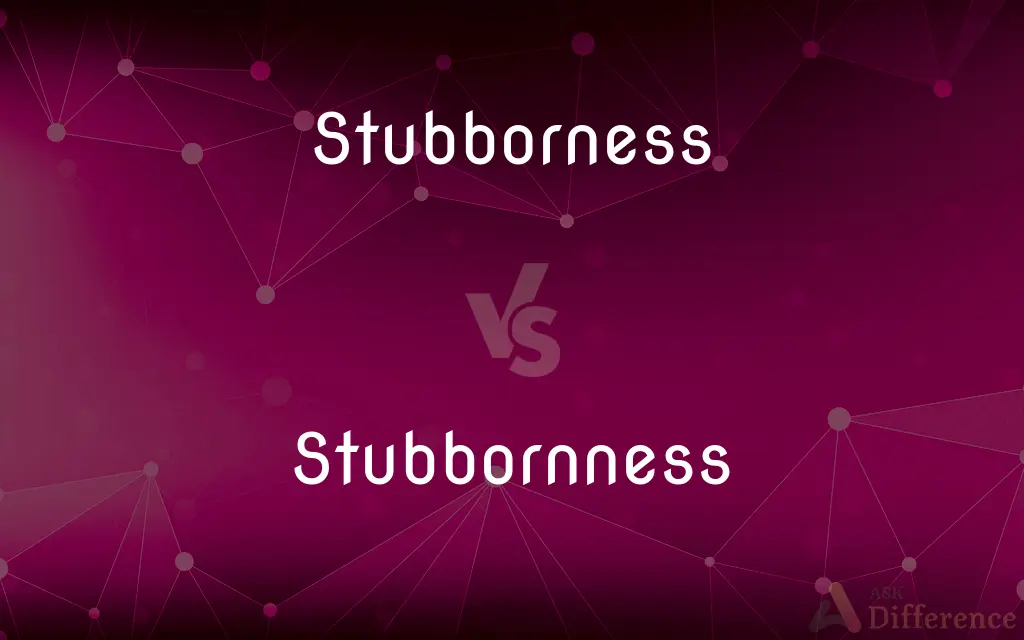Stubborness vs. Stubbornness — Which is Correct Spelling?
By Tayyaba Rehman — Updated on March 26, 2024
"Stubborness" is an incorrect spelling, while "Stubbornness" is the correct form, denoting the quality of being unyielding or persistent.

Table of Contents
Which is correct: Stubborness or Stubbornness
How to spell Stubbornness?

Stubborness
Incorrect Spelling

Stubbornness
Correct Spelling
ADVERTISEMENT
Key Differences
Think of "stubborn" as being doubly persistent, hence two 'n's before "ness."
Relate the double 'n' to a person being doubly insistent, reflecting stubbornness.
Use mnemonic: "Stubborn needS more persistence; thus, double N."
Always remember "stubborn" already has one "n," so add another "ness" to the end.
Note that most words ending in "-ness" retain the last letter of their root word.
ADVERTISEMENT
How Do You Spell Stubbornness Correctly?
Incorrect: Her stubborness was evident when she refused to ask for directions.
Correct: Her stubbornness was evident when she refused to ask for directions.
Incorrect: The team's stubborness to change tactics led to their loss.
Correct: The team's stubbornness to change tactics led to their loss.
Incorrect: His stubborness caused him to miss out on many opportunities.
Correct: His stubbornness caused him to miss out on many opportunities.
Incorrect: Stubborness is not an effective strategy for resolving conflicts.
Correct: Stubbornness is not an effective strategy for resolving conflicts.
Incorrect: Despite her parents' advice, her stubborness led her to make the same mistake again.
Correct: Despite her parents' advice, her stubbornness led her to make the same mistake again.
Stubbornness Definitions
Refusing to change one's mind or course of action despite pressure to do so; unyielding or resolute.
Stubbornness refers to an unyielding or persistent adherence to one's opinions or actions.
Her stubbornness led her to keep trying, even against all odds.
Stubbornness is the quality of being determined not to change one's attitude or position.
His stubbornness prevented him from admitting his mistakes.
Stubbornness is an innate resistance to guidance or discipline.
Parents sometimes struggle with a child's natural stubbornness during the toddler years.
Stubbornness denotes the characteristic of being difficult to move, change, or overcome.
The jar's lid's stubbornness required extra effort to open.
Stubbornness is the trait of being unyielding in attitude or opinion, even in the face of evidence.
Despite the clear facts, his stubbornness stopped him from accepting the truth.
Characterized by a refusal to change one's mind or course of action; dogged or persistent
Stubborn prejudice.
Stubborn earnestness.
Difficult to treat or deal with; resistant to treatment or effort
Stubborn soil.
Stubborn stains.
The state of being stubborn.
What is stubbornness? It is not only refusing to believe a crucial message, but also shunning or at least looking down on those, who stated or believed it in the first place.
Perhaps only when it's found too late for regrets will that person understand.
Perhaps only when it's found too late for regrets will that person understand.
The trait of being difficult to handle or overcome
Resolute adherence to your own ideas or desires
Stubbornness Meaning in a Sentence
John's stubbornness made him continue the hike even after twisting his ankle.
His stubbornness to solve the puzzle without help was admirable, yet time-consuming.
Despite the stubbornness of the weeds, she managed to clear the garden.
Her stubbornness in studying paid off when she scored the highest in the class.
His stubbornness to admit he was lost resulted in hours of extra driving.
The stubbornness of the stain on his shirt made it impossible to remove.
Learning a new language required a level of stubbornness and dedication.
A child's stubbornness can sometimes be a sign of strong willpower.
The old cat's stubbornness about eating only one type of food was frustrating.
The stubbornness of the software bug made it a challenge for the team to fix.
The novel's hero's stubbornness against odds made for an engaging story.
The stubbornness of the winter snow made it difficult for spring flowers to bloom.
Her stubbornness not to laugh at the funny movie finally broke in the last scene.
The stubbornness of the old lock made it difficult for them to open the door.
Her stubbornness to maintain a healthy lifestyle inspired others to do the same.
His stubbornness to wake up early every morning for a jog was truly inspiring.
Her stubbornness in negotiations led to a better deal for her company.
His stubbornness to perfect his craft made him a master woodworker.
The stubbornness of the old beliefs in the village was challenging to overcome.
The dog's stubbornness to stay in the park made it difficult to leave.
Common Curiosities
Why is it called Stubbornness?
Stubbornness is called so because it describes the quality or state of being stubborn, unyielding, or persistent.
What is the pronunciation of Stubbornness?
/stʌbərnˈnɛs/
What is the root word of Stubbornness?
The root word is "stubborn."
What is the verb form of Stubbornness?
The verb form is "to be stubborn."
Which preposition is used with Stubbornness?
"Of" can be used, as in "stubbornness of a mule."
Which vowel is used before Stubbornness?
The vowel "o" is used before the ending "ness."
What is the singular form of Stubbornness?
Stubbornness itself is singular.
What is the plural form of Stubbornness?
There is no standard plural form for Stubbornness as abstract nouns typically do not have plurals.
Which conjunction is used with Stubbornness?
Any conjunction can be used with "stubbornness" depending on the sentence's context, like "and," "but," or "or."
Is Stubbornness an adverb?
No, Stubbornness is not an adverb.
Is Stubbornness a countable noun?
No, Stubbornness is an uncountable noun.
Is Stubbornness a collective noun?
No, Stubbornness is not a collective noun.
Is the word Stubbornness imperative?
No, Stubbornness is not imperative.
What is another term for Stubbornness?
Another term is "intransigence."
What is the opposite of Stubbornness?
Flexibility or adaptability.
What is the first form of Stubbornness?
Stubbornness is a noun, so it doesn't have verb forms like first, second, or third.
Which article is used with Stubbornness?
Both "a" and "the" can be used, depending on the sentence.
Is Stubbornness a negative or positive word?
It is generally viewed as negative, but context can sometimes give it a neutral or even positive connotation.
Is Stubbornness a vowel or consonant?
"Stubbornness" is a word made up of both vowels and consonants.
Which determiner is used with Stubbornness?
Determiners such as "his," "her," "the," or "such" can be used.
Is Stubbornness a noun or adjective?
Stubbornness is a noun.
Is the word Stubbornness a Gerund?
No, Stubbornness is not a gerund.
Is the word “Stubbornness” a Direct object or an Indirect object?
"Stubbornness" can be a direct object, as in "I admire his stubbornness."
How do we divide Stubbornness into syllables?
Stub-born-ness.
What is the second form of Stubbornness?
Again, as a noun, it doesn't have verb forms.
How is Stubbornness used in a sentence?
Her stubbornness was evident when she refused to change her mind despite the evidence.
Is Stubbornness an abstract noun?
Yes, Stubbornness is an abstract noun.
Is the Stubbornness term a metaphor?
By itself, no. However, it can be used metaphorically in some contexts, e.g., "the stubbornness of a rock."
How many syllables are in Stubbornness?
There are three syllables.
What is the third form of Stubbornness?
As mentioned, it's a noun, so it doesn't have verb forms.
What is the stressed syllable in Stubbornness?
The second syllable, "born," is stressed.
What part of speech is Stubbornness?
Stubbornness is a noun.
Share Your Discovery

Previous Comparison
Supervisior vs. Supervisor
Next Comparison
Dessire vs. DesireAuthor Spotlight
Written by
Tayyaba RehmanTayyaba Rehman is a distinguished writer, currently serving as a primary contributor to askdifference.com. As a researcher in semantics and etymology, Tayyaba's passion for the complexity of languages and their distinctions has found a perfect home on the platform. Tayyaba delves into the intricacies of language, distinguishing between commonly confused words and phrases, thereby providing clarity for readers worldwide.














































